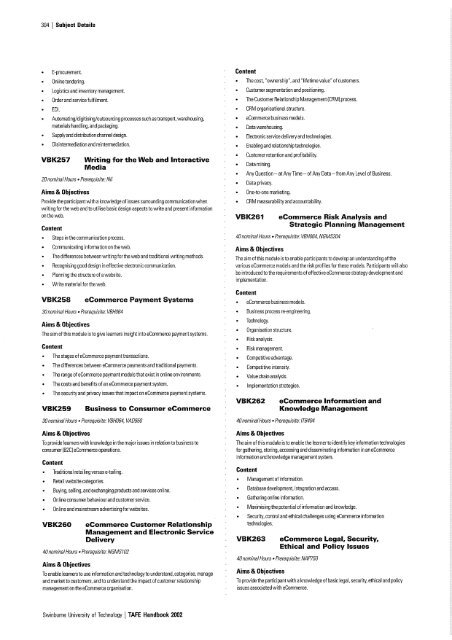2002 Swinburne TAFE Handbook - Swinburne University of ...
2002 Swinburne TAFE Handbook - Swinburne University of ...
2002 Swinburne TAFE Handbook - Swinburne University of ...
Create successful ePaper yourself
Turn your PDF publications into a flip-book with our unique Google optimized e-Paper software.
304 I Subject Details<br />
E-procurement.<br />
Online tendering.<br />
Logistics and inventory management.<br />
Order and service fulfilment.<br />
ED!.<br />
Automating/digitising/outsourcing processes such as transport, warehousing,<br />
materials handling, and packaging.<br />
Supply and distribution channel design.<br />
Disintermediation and reintermediation.<br />
VBK257<br />
20 nominal Hours· Prerequisite: Nil<br />
Aims & Objectives<br />
Writing for the Web and Interactive<br />
Media<br />
Provide the participant with a knowledge <strong>of</strong> issues surrounding communication when<br />
writing forthe web and to utilise basic design aspects to write and present information<br />
on the web.<br />
Content<br />
Steps in the communication process.<br />
Communicating information on the web.<br />
The differences between writing forthe web and traditional writing methods.<br />
Recognising good design in effective electronic communication.<br />
Planning the structure <strong>of</strong> a website.<br />
Write material forthe web.<br />
VBK258<br />
30 nominal Hours· Prerequisite: VBH064<br />
Aims & Objectives<br />
eCommerce Payment Systems<br />
The aim <strong>of</strong> this module is to give learners insight into eCommerce payment systems.<br />
Content<br />
The stages <strong>of</strong> eCommerce payment transactions.<br />
The differences between eCommerce payments and traditional payments.<br />
The range <strong>of</strong> eCommerce payment models that exist in online environments.<br />
The costs and benefits <strong>of</strong> an eCommerce payment system.<br />
The security and privacy issues that impact on eCommerce payment systems.<br />
VBK259<br />
Business to Consumer eCommerce<br />
30 nominal Hours· Prerequisite: VBH06{ VAD950<br />
Aims & Objectives<br />
To provide learners with knowledge in the major issues in relation to business to<br />
consumer (B2C) eCommerce operations.<br />
Content<br />
Traditional retailing versus e-tailing.<br />
Retail website categories.<br />
Buying, selling, and exchanging products and services online.<br />
Online consumer behaviour and customer service.<br />
Online and mainstream advertising forwebsites.<br />
VBK260<br />
eCommerce Customer Relationship<br />
Management and Electronic Service<br />
Delivery<br />
40 nominal Hours· Prerequisite: NGMSI 02<br />
Aims & Objectives<br />
To enable learners to use information and technology to understand, categorise, manage<br />
and market to customers, and to understand the impact <strong>of</strong> customer relationship<br />
management on the eCommerce organisation.<br />
Content<br />
The cost, "ownersh i p", and" lifetime val ue" <strong>of</strong> customers.<br />
Customer segmentation and positioning.<br />
The Customer Relationship Management (CRM) process.<br />
CRM organisational structure.<br />
eCommerce business models.<br />
Data warehousing.<br />
Electronic service delivery and technologies.<br />
Enabling and relationship technologies.<br />
Customer retention and pr<strong>of</strong>itability.<br />
Data mining.<br />
Any Question - at Any Time - <strong>of</strong> Any Data - from Any Level <strong>of</strong> Business.<br />
Data privacy.<br />
One-to-one marketing.<br />
CRM measurability and accountability.<br />
VBK261<br />
eCommerce Risk Analysis and<br />
Strategic Planning Management<br />
40 nominal Hours· Prerequisite: VBH064, NGMS204<br />
Aims & Objectives<br />
The aim <strong>of</strong>this module is to enable participants to develop an understanding <strong>of</strong>the<br />
various eCommerce models and the risk pr<strong>of</strong>iles for these models. Participants will also<br />
be introduced to the requirements <strong>of</strong> effective eCommerce strategy development and<br />
implementation.<br />
Content<br />
eCommerce business models.<br />
Business process re-engineering.<br />
Technology.<br />
Organisation structure.<br />
Risk analysis.<br />
Risk management.<br />
Competitive advantage.<br />
Competitive intensity.<br />
Value chain analysis.<br />
Implementation strategies.<br />
VBK262<br />
40 nominal Hours· Prerequisite: ITB404<br />
Aims & Objectives<br />
eCommerce Information and<br />
Knowledge Management<br />
The aim <strong>of</strong>this module is to enable the learner to identify key information technologies<br />
for gathering, storing, accessing and disseminating information in an eCommerce<br />
information and knowledge management system.<br />
Content<br />
Management <strong>of</strong> information.<br />
Database development, integration and access.<br />
Gathering online information.<br />
Maximising the potential <strong>of</strong> information and knowledge.<br />
Security, control and ethical challenges using eCommerce information<br />
technologies.<br />
VBK263<br />
40 nominal Hours· Prerequisite: NAP750<br />
Aims & Objectives<br />
eCommerce Legal, Security,<br />
Ethical and Policy Issues<br />
To provide the participant with a knowledge <strong>of</strong> basic legal. security, ethical and policy<br />
issues associated with eCommerce.<br />
<strong>Swinburne</strong> <strong>University</strong> <strong>of</strong> Technology I <strong>TAFE</strong> <strong>Handbook</strong> <strong>2002</strong>
















